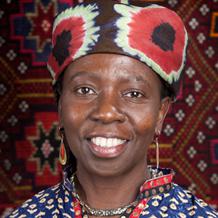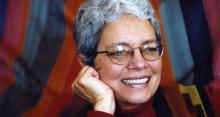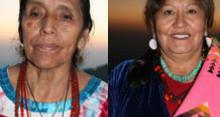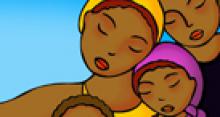What’s Different and What’s the Same
Big Ideas
Leading thinkers and activists share game-changing ideas about motherhood and improving maternal health and women's rights.

with input from Wariri Muhungi, Musimbi Kanyoro’s daughter
When the International Museum of Women asked me to contribute my thoughts to the subject of “motherhood… then and now”, I thought this would be an easy and obvious theme and I accepted immediately. However, when I began to work on it, I realized that it was more complicated than I anticipated. I invited my daughter, who is also a mother, to dialogue and reflect with me, making the process even more complex.
Come with me for a short trip through my life as a daughter, a mother, and grandmother. Before doing so, I have to tell you about the context from which I write. I am an African woman who is privileged. I became a mother in a marriage that is a partnership, where there is genuine sharing of responsibilities including mothering.
My parents were educated and they prioritized education for us over everything. My mother’s words still echo: “I can give you food and you will go hungry within an hour, but when you get education it will open doors for you.” Indeed, for me, this resulted in growth, contacts, and opportunities that have taken me all over the world. The role of my mother in my life shapes my personal experiences in unique ways, and at the same time, gives me confidence to see some significant similarities in the lives of women globally.

I have been a mother in a privileged environment, benefitting from childcare, access to vacuum cleaners, disposable napkins, clean water, electricity, the Internet and hundreds of other conveniences. My mother did not have access to these conveniences, yet she was everything to us, proof that mothering is people, not things. With mum, it was either yes or no, and she used “maybe” sparingly. Her role as a teacher, caregiver and coach were obvious. As her daughter, I felt safe to share my joys and frustration.
It is this kind of guidance that framed my motherhood. However, I sometimes struggled with my role as a mother. In areas where my mother was indispensable, I was less needed due to the abundance of information that was accessible to my daughter. The short span of technological changes and contextual difference in which women live show the contradictions that exist for women as grandmothers, mothers and daughters. My daughter did not need me as much I needed my mother, or my mother needed hers. Living in Europe and North America may have given my daughter more exposure to different worlds, but it introduced her to issues of race, capitalism, sexism, and gender oppression. She was shortchanged on the joys and challenges of extended family and communal living.
I chose to pass on the positives of community knowledge, and provide my children with guidance, self-awareness and resiliency. But, they were not spared from learning about mothers who promote child marriage for their daughters, enforce genital mutilation, or give preference to boys even in matters of education and are phobia for difference, especially in sexual orientation.
I have worked with women for nearly 30 years and I want to make two concluding remarks: First, we live in a dominantly patriarchal culture. The consequence of this continues to shape women’s identity and also affects our role as mothers. The intergenerational struggle to liberate us from patriarchy is deeply connected to mothering worldwide.
Women can be seen as property in a patriarchal culture. When women’s bodies are perceived as instruments for reproduction, motherhood becomes oppressive. It is this same mentality that dehumanizes barren women, pressurizes women to delay child bearing for population reduction, and blames teenage girls when they want to have babies because they feel invisible to their loved ones and to society.
Until all women have their rights respected, I don’t think we will be able to realize the full meaning of my favorite African saying: “mother is supreme.”
Secondly, patriarchy causes women to feel conflicted about our identity as mothers. Motherhood comes with many competing demands from our children, from our families, our community, and our work. Balancing the personal and the professional is an ongoing struggle, and not exploring positive ways to find a balance can lead to feelings of guilt and self-blame. It is not uncommon to hear women share their feelings of inadequacy and frustration for not being “the best” mother or worker. This is an area that I saw my mother struggle; I have struggled with it as well. I see my daughter struggling to juggle with the complexities of being a mother and a community organizer.
It seems like my mother succumbed to the mother role. She had ten of us and although firmly rooted in community and family where she got her support, handling an additional job was not practical. I chose to be a working mother of two children so that I could also be a mother to women’s human rights and deeply immerse myself in fostering social justice globally. My daughter will probably opt for a smaller family but reclaim more of the community life that was key to my mother’s life.
A holistic view of mothering recognizes that motherhood is not limited to giving birth and having to choose between work and family. Women are mothers by mothering communities in their respective organizing spaces. Millions of women intentionally choose to not have children and devote their lives to other interests that are equally valuable. Women’s movements are about bringing deeper understanding about the humanity of all women.
Related Content
|
Stereotypes of grandmothers, writes Paola Gianturco, no longer apply, and instead the elder generation are fighting against the status quo as activists and leaders. |
Indigenous grandmothers advocate for passing on essential traditions from their indigenous cultures. |
Valerie Mason-John tells the affecting story of a woman in Sierra Leone who lost many of her children and watched her country be torn apart by war and the search for blood diamonds. |
Paula Obè's song/poem celebrates her mother and grandmother as well as our women ancestors who paved the path for women's equality.
|





